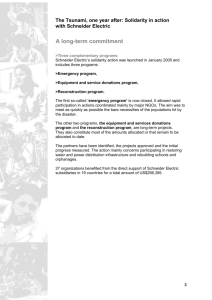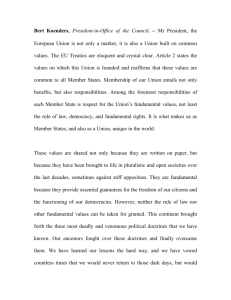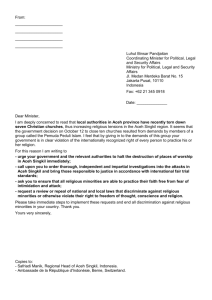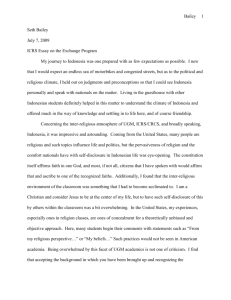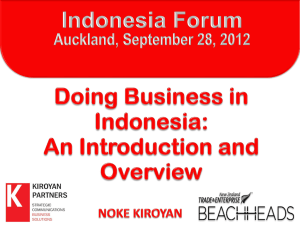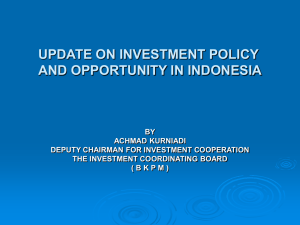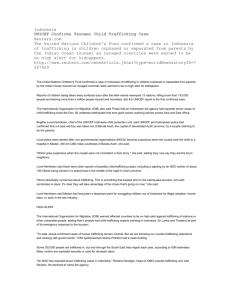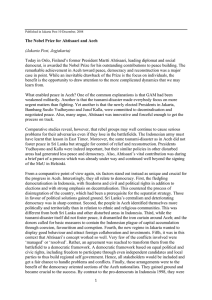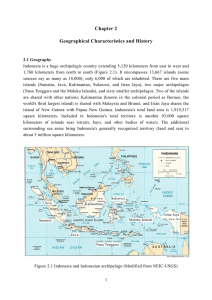DOC - Europa
advertisement
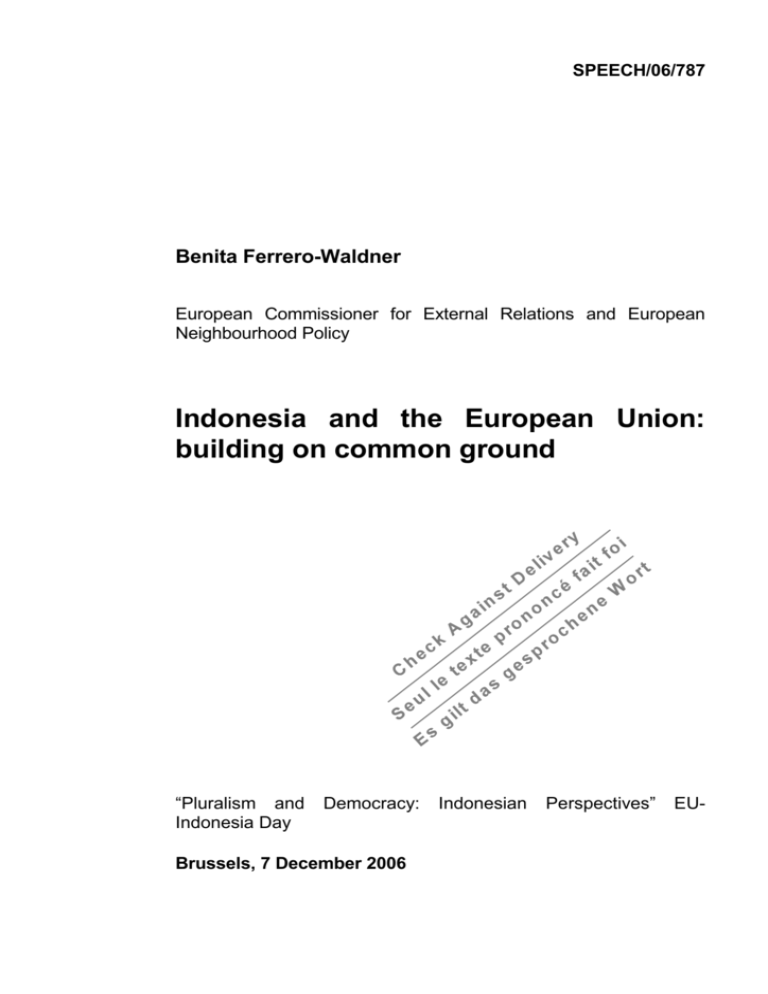
SPEECH/06/787 Benita Ferrero-Waldner European Commissioner for External Relations and European Neighbourhood Policy Indonesia and the European Union: building on common ground “Pluralism and Indonesia Day Democracy: Brussels, 7 December 2006 Indonesian Perspectives” EU- Dr. Din, Excellencies, Panellists, Ladies and Gentlemen, First let me welcome you to Brussels, and to the European Commission. I am delighted to see quite a lot here today. I hope the long journey some of you will have had to get here won’t take its toll later today! But I am confident that the discussions will be more than lively enough to overcome any residual jetlag Because the subject of today’s conference, “Pluralism and Democracy”, I would say is one of the most pertinent topics in world affairs today. It goes to the heart of the debate about what it means to be a state in the 21st century. And to the heart of the debate about identity, and the individual’s relation with the state. These issues are not confined to particular parts of the world. They are issues we are all grappling with, as we face the challenges of globalisation, demographic and economic changes; as we have to reconcile old and new values; and as we have to find jobs and opportunities for the young. Indonesia and the European Union have a great deal in common both in the challenges we face and in the way we are dealing with them. Which is why we wanted to bring you all together at this conference today. We firmly believe that by understanding each other better we will work together more closely. And by working together more closely we will find more successful answers to the issues we have to address. Ladies and Gentlemen, The biggest challenges to democracy in our time come from economic and social stagnation or fragile institutions. Around the world people are defining their identity less by nationality and more by ethnicity or by their religious beliefs. The diminished loyalty to the state raises issues for us all. Indonesia has seen for itself what it means for a large and diverse nation to transition from autocratic rule to a vigorous multiparty system. President Yudhoyono and his government have been taking bold steps to combat corruption, promote good governance and decentralisation, and implement economic and structural reforms. But no one would claim that the task is accomplished. Building and then sustaining democracy requires constant vigilance to ensure fundamental values are protected. Indonesia is still working to reconcile conflicting pressures within society. Yet human rights, including women’s rights, and democratic values must be respected whatever the cultural or religious context. We know it is not easy. The EU would like to learn more about the debate within Indonesia and how we could help you as you work to build and safeguard your democracy. We also want to hear more about Indonesia’s approach to religious and secular values in such a large and vibrant multicultural and multi-ethnic country. These are issues which increasingly affect the EU. The basic question we all face is how to accommodate difference whilst ensuring fundamental values are respected. Tolerance and respect are the watchwords. And how do we build tolerance and respect? Through dialogue. That holds true both within and between states. 2 Within Europe the European Commission is fully committed to fostering dialogue with Europe’s major religions and communities of conviction. We know we face challenges integrating minority populations into Europe and that it is not easy to build cohesive societies comfortable with difference in their midst. I think it is emphatically not a question of European versus religious values. Freedom of religion is indeed non-negotiable. It is a fundamental right of individuals and communities and entrails respect for the integrity of all religious convictions and all ways in which they are exercised – if they are exercised in a peaceful way of course. Similarly, freedom of speech is non-negotiable, although it does come with responsibilities. Nor is it a question of assimilation or of any community giving up core beliefs and value which are closes to their heart. It is about Europeans exercising their religious and social identity, without any contradiction. Similarly dialogue is important internationally. We do not believe in a clash of civilisations, at worst there is a clash of ignorance. And the answer is more dialogue to build trust, resulting in closer and more effective partnership. We must all work to combat ignorance and fight fundamentalism and extremism on all sides. Today’s conference will, I hope, contribute to that better understanding and so enhance tolerance and respect. But there’s another element to today’s conference which I’d like to highlight - that is the contribution democratic and pluralist societies can make to conflict resolution. It has long been recognised that democracies are less likely to engage in international conflicts than non-democratic regimes. Similarly, at the national level, democracies provide a political channel for tensions and disputes which might otherwise end up in violent conflict. It is surely no coincidence that the dramatic breakthrough in the Aceh conflict has come as Indonesia’s democracy has grown stronger. Aceh proves that a serious and genuine commitment to addressing conflict by all parties can achieve indeed peace even after decades of distrust and violence. I am delighted that on 11 December the people of Aceh will elect their local leaders – it is a triumph for democracy and peace. The Indonesian government and people should be proud of their achievement. We are proud to have been helping you in this process and in supporting Martti Ahtissari. We know that peace is sustained more effectively by better public services and reliable institutions than by robust responses from the military. So even after the Aceh Monitoring Mission departs later this month, the European Commission will continue its support for the peace process with assistance for governance, election support, reintegration, and police and justice reform. Our commitment to Aceh is as strong as ever. We would also like to learn more about the forces of change at work in Aceh, not least to see if there are lessons to be learned from this experience which could help other countries. 3 Ladies and Gentlemen, Indonesia is the biggest Muslim country in the world and has a leadership committed to dialogue and to reform. So it is ideally placed to promote the virtues of pluralism and democracy to the international community. For our part the European Union is committed to foster its dialogue with Indonesia and to maintain its support for the Indonesian government’s reform efforts. The new Partnership and Cooperation Agreement between us, which should be finalized soon, should help cement our ties; as will the increase in our development cooperation for 2007-2013. There is a great deal we can offer one another and today’s debate will make a useful contribution. You have a fascinating day of debate ahead of you, so let me close now and hand over the floor to Dr Din. Thank you. 4

